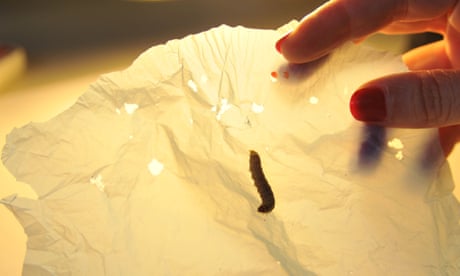- by foxnews
- 08 Apr 2025
Wax worm saliva rapidly breaks down plastic bags, scientists discover
Wax worm saliva rapidly breaks down plastic bags, scientists discover
- by theguardian
- 05 Oct 2022
- in news

Enzymes that rapidly break down plastic bags have been discovered in the saliva of wax worms, which are moth larvae that infest beehives.
The enzymes are the first reported to break down polyethylene within hours at room temperature and could lead to cost-effective ways of recycling the plastic.
Polyethylene makes up 30% of all plastic production and is used in bags and other packaging that make up a significant part of worldwide plastic pollution. The only recycling at scale today uses mechanical processes and creates lower-value products.
Chemical breakdown could create valuable chemicals or, with some further processing, new plastic, thereby avoiding the need for new virgin plastic made from oil. The enzymes can be easily synthesised and overcome a bottleneck in plastic degradation, the researchers said, which is the initial breaking of the polymer chains. That usually requires a lot of heating, but the enzymes work at normal temperatures, in water and at neutral pH.
Previous discoveries of useful enzymes have been in microbes, with a 2021 study indicating that bacteria in oceans and soils across the globe are evolving to eat plastic. It found 30,000 different enzymes that might degrade 10 different types of plastic.
A super-enzyme that quickly breaks down plastic drink bottles, usually made from PET plastic, was revealed in 2020, inspired by a bug found in a waste dump in Japan and accidentally tweaked to increase its potency. An enzyme that breaks down PET has also been produced from bacteria in leaf compost, while another bug from a waste dump can eat polyurethane, a plastic that is widely used but rarely recycled.
Millions of tonnes of plastic are dumped every year, and the pollution pervades the planet, from the summit of Mount Everest to the deepest oceans. Reducing the amount of plastic used is vital, as is the proper collection and treatment of waste, and full recycling could cut new plastic production.
Wax worm larvae live and grow in the honeycombs of beehives and feed on beeswax, which may be why they have evolved the enzymes. Another possibility is the enzymes break down the toxic chemicals produced by plants as a defence and which are similar to some additives in plastics.
- by foxnews
- descember 09, 2016
Ancient settlement reveals remains of 1,800-year-old dog, baffling experts: 'Preserved quite well'
Archaeologists have recently unearthed the remarkably well-preserved remains of a dog from ancient Rome, shedding light on the widespread practice of ritual sacrifice in antiquity.
read more


